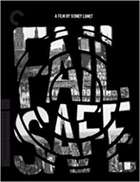Fail-Safe
|  One of the best things I can say about Sidney Lumet’s Fail-Safe is that, by about the midway point, I had (mostly) stopped thinking about Stanley Kubrick’s Dr. Strangelove, or How I Learned to Stop Worrying and Love the Bomb (1964). And I get it—that’s not fair. Fail-Safe, from the time of its release in October 1964, has always suffered in comparison to Kubrick’s blackly comic Cold War masterpiece, which Kubrick insisted be released first (both were produced by Columbia Pictures). Although based on different novels, both films have virtually identical plots and nearly indistinguishable narrative beats that tapped a mainline vein of shared paranoia about worldwide nuclear annihilation (it was only two years since the Cuban Missile Crisis, after all). Kubrick, after trying and failing to play the material straight, instead went the route of dark satire, whereas Lumet and screenwriter Walter Bernstein (a television veteran who was just emerging from a decade of being blacklisted) stuck with the straight and narrow, playing out the story of a nuclear stand-off between the United States and the Soviet Union with grim seriousness. Kubrick claimed he couldn’t make it work that way; the material was just too absurd to be taken seriously. Lumet, to his credit, proved Kubrick wrong. Fail-Safe was based on the 1962 novel of the same title by two political science professors, Eugene Burdick and Harvey Wheeler. The plot revolves around a horrible “what-if?” scenario: What if nuclear war were triggered between the U.S. and the U.S.S.R. due to a technical malfunction? In this case, the malfunction involves a failed communication to a squadron of American B-52 bombers that have been sent to their “fail-safe” point just outside the border of the Soviet Union. Instead of ordering them to return to base, the communication delivers to them a special attack code to drop nuclear bombs on major Soviet targets (including Moscow). The bombers are under strict instruction not to reply to any communication once the attack code had been transmitted (to avoid the attack being falsely called off by the Soviets), so recalling them after that point is all but impossible. This puts the U.S. and the U.S.S.R. in a virtually impossible situation in which the former has essentially launched an unprovoked attack on the latter, who can do almost nothing about it. The Soviets can try to shoot down all the bombers, but it is highly likely that at least one of them will get through and deliver its payload on Moscow, killing millions of people instantly. As in Kubrick’s film, different characters reflect different perspectives on handling Cold War tensions. The voice of reason is the U.S. President, who is played with a sense of dignity, restraint, and honor (think the opposite of Donald Trump) by Peter Fonda, that great icon of fundamental American decency. The President spends most of the film inside a bunker under the White House with a Russian translator named Buck (Larry Hagman) on the phone with the Soviet premier, trying to convince him that the attack was not intended and helping the Soviet forces shoot down all the American planes before they can drop their bombs. Meanwhile, in the war room at the Pentagon, there is an ongoing struggle between Brigadier General Warren A. “Blackie” Black (Dan O’Herlihy), a close friend and confidant of the President’s who represents military and political sanity, and Colonel Cascio (Fritz Weaver), who is convinced that the whole situation is an elaborate ruse created by the Soviets to trick them into striking first and therefore justifying all-out nuclear war. And, constantly in the background is Professor Groeteschele (Walter Matthau), a grim political science professor and hawkish advisor to the Pentagon who is sure that this is a golden opportunity for the U.S. to wipe out the Soviet Union. The dispassion with which he discusses collateral damage in the millions is genuinely unnerving (Matthau delivers the film’s best performance, a far cry from the bumbling comic roles for which he would later be known). Lumet, who had recently moved from television to helming critically acclaimed features like Long Day’s Journey Into Night (1962) and The Pawnbroker (1964), was an ideal director for the material; he carefully balances the big-picture doomsday scenario with a tight focus on the individual characters. The film is replete with intense moments and a grueling accumulation of suspense, as it becomes more and more likely that the worst-case scenario will be realized, thus putting fundamentally decent men into the position of having to make horrific choices to stave off even worse possibilities. Lumet and cinematographer Gerald Hirschfeld (Last Summer, Young Frankenstein) keep the film’s visuals fairly straightforward, although they throw in a few showy aesthetic twists, such as focusing at one point on the President’s off-center eye in a tense moment or ending the film on a series of sudden zooms into still images that make abundantly clear the potential price of playing nuclear roulette. Fail-Safe doesn’t pull any of its punches, and it has the strength of its own convictions to see things through the logical end, horrible though it may be. The end of Dr. Strangelove is, of course, worse in its way, but I wasn’t (really) thinking about that until long after the credits had ended.
Copyright © 2019 James Kendrick Thoughts? E-mail James Kendrick All images copyright © The Criterion Collection and Sony Pictures Home Entertainment | |||||||||||||||||||||||||||||||
Overall Rating: 


 (3.5)
(3.5)


